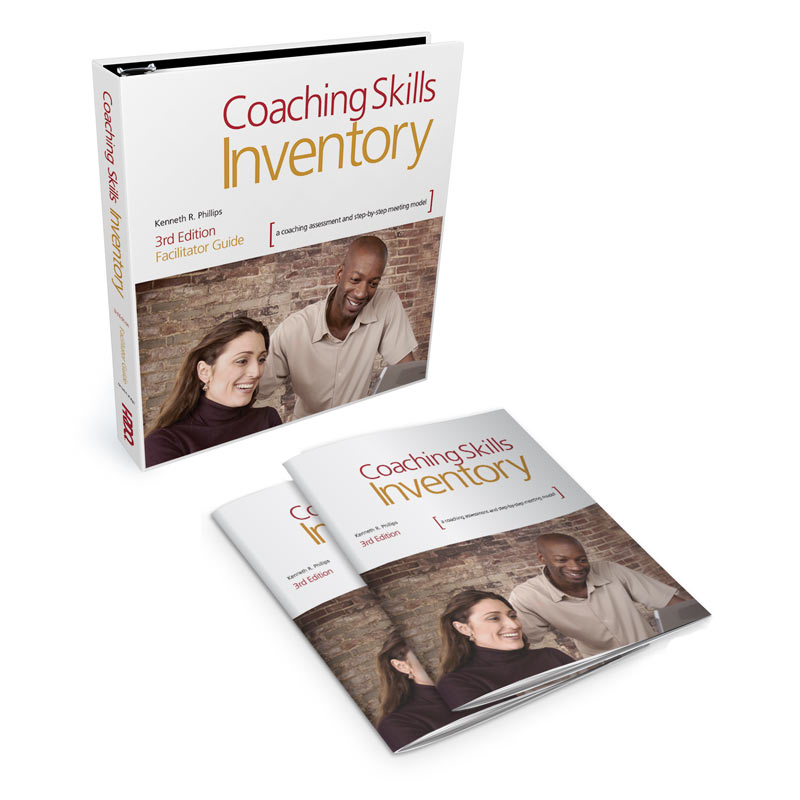COACHING SKILLS INVENTORY
3rd Edition by Kenneth Phillips
Available in both Online and Paper-Based Format
If you think performance issues will magically vanish into thin air, think again.Have you ever had a manager who talked with an employee say, one, two, maybe three times about a nagging performance issue - but no good ever came from it? Or maybe you're familiar with the manager who chooses to pretend problems don't exist and ignores them altogether. And then there's the over-controlling manager who likes to chew out employees when their performance isn't up to snuff. Unfortunately, these types of scenarios occur far too often in the workplace and they're a lose-lose predicament for not only the employee and manager, but the organization as well.
Skilled managers know that the first step to effective coaching is to establish a rapport based on mutual trust. It's the foundation of healthy manager-employee relationships and the key to growth and performance. But that's only the first step. To ensure a truly productive coaching meeting, managers need to follow a seven-step process:
- Building a Relationship of Mutual Trust
- Opening the Meeting
- Getting Agreement
- Exploring Alternatives
- Getting a Commitment to Act
- Handling Excuses
- Closing the Meeting
This approach to performance coaching doesn't come from gut instinct or intuition alone. That's why the best place to initiate training is with the Coaching Skills Inventory. Designed for supervisors, managers, and team leaders, this assessment measures the ability to conduct effective coaching meetings and build productive relationships with employees. With the help of the Coaching Skills Inventory, they develop the ability--and the confidence--to redirect employee behavior and improve everyday performance.
Presented with 18 everyday coaching situations, managers select the action response they are most likely to take. Scoring the inventory produces an Overall Coaching-Effectiveness Profile, and the subscores measure their skill level in each of the seven steps of the Coaching Meeting Model process.
The self-assessment takes approximately 20 minutes to complete, and an additional 40 minutes (minimum) is required for the scoring, interpretation of results, debrief, and goal setting. You can expand the learning into a three-hour program using the workshop outline and PowerPoint presentation that's offered in the Facilitator Guide. Also included is follow-up assessment you can administer to measure progress post-training. Trainer certification is not required to administer or facilitate the Coaching Skills Inventory.
Learning Outcomes
- Identify strengths and weaknesses in the skills needed for effective coaching meetings.
- Compare skill levels with a normative group of managers from a wide range of industries.
- Acquaint managers, supervisors, and team leaders with a seven-step model for effective coaching meetings.
- Help employees to improve their performance through effective performance coaching meetings.
- Measure the development of coaching skills pre- and post-training.
Uses for the Assessment
The Coaching Skills Inventory is excellent as a stand-alone learning instrument or part of a more comprehensive training program. It's appropriate for use with managers, supervisors, and team leaders. The Coaching Skills Inventory can also be used with prospective managers to help them prepare for their coaching responsibilities when they are promoted.
Use the assessment to:
- Introduce a new performance management system within an organization.
- Assess the coaching strengths and weaknesses of individual managers.
- Identify the collective skill level of managers within an organization.
- Reinforce performance coaching skills after a training event.
- Examine the effect and results of training using pre- and post-training scores.
Product Type
Self-assessment
Measures
Ability to conduct effective performance coaching meetings
Dimensions
Building a Relationship of Mutual Trust
Opening the Meeting
Getting Agreement
Exploring Alternatives
Getting a Commitment to Act
Handling Excuses
Closing the Meeting
Time Required
Administration: 20 minutes
Interpretation: 40 minutes
Workshop: 3 hours
